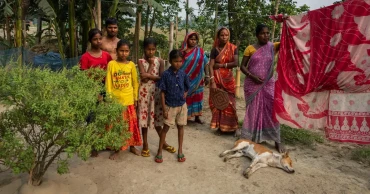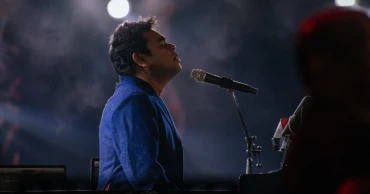Indian
Indian military alleges Pakistani troops fired across Kashmir border for 2nd night
The Indian military on Saturday accused Pakistani forces of firing on Indian positions along the Line of Control (LoC) in the disputed Kashmir region for a second straight night, amid rising tensions between the two nuclear-armed neighbors following a deadly attack on Indian tourists.
In a statement, the Indian army said soldiers at multiple Pakistani posts opened fire overnight across the LoC, prompting Indian troops to respond with small arms fire. The Indian military labeled the firing as “unprovoked” and reported no casualties.
This follows a similar incident reported on Friday, when Indian forces claimed they were targeted with small arms fire in the Gurez sector the previous night.
ICE is reversing the termination of legal status for international students around the US
There was no immediate response from Pakistan, and the claims have not been independently verified. Both countries have a history of blaming each other for initiating border clashes in the contested Himalayan region.
The escalation comes in the wake of Tuesday’s attack near Pahalgam in Indian-administered Kashmir, where gunmen killed 26 people, mostly tourists. India labeled the incident a terrorist attack and blamed Pakistan for supporting it.
Pakistan, however, denied involvement, and a little-known group calling itself the Kashmir Resistance claimed responsibility.
The attack was the worst against civilians in the region in years and has triggered heightened tensions. India and Pakistan, who each claim Kashmir in full and have fought two wars over it, have since taken retaliatory measures.
India suspended a longstanding water-sharing treaty on Wednesday, shut down the only operational land border crossing, and announced all Pakistani visas would be revoked by Sunday. In response, Pakistan canceled Indian visas, closed its airspace to Indian aircraft, and halted bilateral trade.
Travelers from both countries began returning home through the Wagah border near Lahore on Friday.
Iran to ink $4b oilfields deal with Russia
Islamabad also issued a stern warning, saying any attempt by India to stop or divert river waters would be treated as an “act of war.” The move threatens to worsen water shortages in parts of Pakistan already facing drought conditions.
India maintains that all militant activity in Kashmir is backed by Pakistan, a charge Islamabad denies, asserting instead that the insurgency reflects a local struggle for independence among Kashmir’s Muslim-majority population.
10 months ago
Two Indian nationals arrested in B’baria
Members of the Border Guard Bangladesh (BGB) have detained two Indian nationals for evading customs duties and bringing in goods.
They were detained from the Akhaura land port area in Brahmanbaria and handed over to the police on Tuesday, said Akhaura Police Station Officer-in-Charge Mohammad Somiuddin on Wednesday.
6 arrested over attack on DoE official at Chawkbazar polythene factory
BGB seized goods worth around Tk 8.5 lakh from the two Indian nationals, including three-piece suits, cream, and alcohol, ehe said.
The arrestee Indian nationals are Rahul Mia (28) and Selina Begum (45), both from the Ramnagar area of Tripura, India.
Their passports were also confiscated, and they were sent to jail through court proceedings on Wednesday, the OC said.
Police arrest 3 suspected mugging gang members in Dhaka's Uttarkhan
BGB's Habildar Mohammad Zakir Hossain filed a case against the detainees in which it was stated that the two Indian nationals were searched while travelling by auto-rickshaw after passing through the land port area on Tuesday afternoon.
During the search, 52 three-piece suits, 1700 pieces of cream, and five bottles of alcohol were found. However, they were unable to produce any documents to justify the goods. They admitted to bringing the goods by evading customs duties, according to the BGB.
1 year ago
Indian woman among 3 detained while making fake NID card in Barishal
Police detained three people including an Indian woman from Wazirpur upazila election office in Barishal while trying to get national identity cards on Thursday.
The detainees were Sabitri Baria, 29, daughter of Shyam Sundar Baria of Bankavihar village in Patnanagar upazila of India’s Odisha state, Ebaidul Hawlader, 26, and his elder brother Enamul Hawlader, 29, sons of late Abdus Salam Hawlader of ward No-6 under Satla union under in the Wazirpur upazila.
Shop employee burnt to death in Barishal fire
The detainees including the Indian national tried to make the NID card with the certificate and birth certificate issued by Satla Union Parishad Chairman Md Shaheen Hawlader and UP member Md Harun.
The detainees said Ebaidul married Sabitri seven years ago though they could not show any documents of this marriage.
JCI Barishal distributes warm clothes to 150 children
Changing name as Halima Khanam, the Indian national submitted fake documents to the Wazirpur Upazila Election Office.
Suspecting their movement and fake documents, Election Officer Abdur Rashid detained them and handed them over to police.
BPL 2024: Chattogram Challengers beat Fortune Barishal, march to second spot
UP Chairman Md Shaheen Howlader said the certification was taken by misunderstanding.
Md Jafar Ahmed, Officer-in-Charge of Wazirpur Model Police Station, said an interrogation was underway while legal actions would be taken against them.
2 years ago
As India is set to become the most populous country, some struggle to prove they are Indians
Krishna Biswas is scared. Unable to prove his Indian citizenship, he is at risk of being sent to a detention center, far away from his modest hut built of bamboo wood that looks down on fields lush with corn.
Biswas says he was born in India’s northeastern Assam state. So was his father, almost 65 years ago. But the government says that to prove he is an Indian, he should furnish documents that date back to 1971.
For the 37-year-old vegetable seller, that means searching for a decades-old property deed or a birth certificate with an ancestor’s name on it.
Biswas has none, and he is not alone. There are nearly 2 million people like him — over 5% of Assam's population — staring at a future where they could be stripped of their citizenship if they are unable to prove they are Indian.
Questions over who is an Indian have long lingered over Assam, which many believe is overrun with immigrants from neighboring Bangladesh.
Also Read: Trouble looms for Indian grain that combats climate change
At a time when India is about to overtake China as the most populous country, these concerns are expected to heighten as Prime Minister Narendra Modi’s government seeks to use illegal immigration and fears of demographic shift for electoral gains in a nation where nationalist sentiments run deep.
The ruling Bharatiya Janata Party has promised to roll out a similar citizenship verification program nationwide even though the process in Assam has been put on hold after a federal audit found it flawed and full of errors.
Nonetheless, hundreds of suspected immigrants with voting rights in Assam have been arrested and sent to detention centers the government calls “transit camps.” Fearing arrest, thousands have fled to other Indian states. Some have died of suicide.
___
EDITOR’S NOTE: This story is part of an ongoing series exploring what it means for the 1.4 billion inhabitants of India to live in what will be the world’s most populated country.
___
Millions of people like Biswas, whose citizenship status is unclear, were born in India to parents who immigrated many decades ago. Many of them have voting cards and other identification, but the state’s citizenship registry counts only those who can prove, with documentary evidence, that they or their ancestors were Indian citizens before 1971, the year Bangladesh was born.
Modi’s party, which also rules Assam, argues the registry is essential to identify people who entered the country illegally in a state where ethnic passions run deep and anti-immigrant protests in the 1980s culminated in the massacre of more than 2,000 immigrant Muslims.
“My father and his brother were born here. We were born here. Our kids were also born here. We will die here but not leave this place,” Biswas, said on a recent afternoon at his home in Assam’s Murkata village, near the banks of the Brahmaputra River.
Also Read: India poised to become world’s most populous nation this week: UN
The Biswas family has 11 members, of whom the citizenship of nine is in dispute. His wife and mother have been declared Indian by a foreigners’ tribunal that decides on citizenship claims. Others, including his three children, his father and his brother’s family, have been declared “foreigners.”
It makes no sense to Biswas, who wonders why would some be considered to have settled in the country illegally and others not, even though they all were born in the same place.
The family, like many others, has not pleaded their case before the tribunal or higher courts due to a lack of money and the arduous paperwork required in the process.
“If we cannot be Indian then just kill us. Let them (the government) kill my whole family,” he said.
The registry was last updated in 2019 and excluded both Hindus and Muslims, but most critics view it as an attempt to deport millions of minority Muslims.
They say the process would become even more exclusionary if Modi’s party resurrects a controversial citizenship bill that grants citizenship to persecuted believers who entered India illegally from neighboring countries, including Hindus, Sikhs and Christians, but not Muslims. The nationwide citizenship bill was introduced in 2019, but led to widespread protests across India for singling out Muslims, forcing the government to put it on the backburner.
Supporters of the registry say it is essential to protect the cultural identity of Assam’s indigenous people, arguing that those who entered illegally are taking away their jobs and their land.
“The influx of illegal foreigners from Bangladesh is a threat to the identity of the indigenous people of Assam. We cannot stay like a second class citizen under illegal Bangladeshis. It is a question of our own existence,” said Samujjal Bhattacharya, who has been part of a movement in Assam against illegal immigration.
Fearing a possible loss of citizenship, scores of people in Assam have killed themselves, leaving a trail of devastation among families.
When Faizul Ali was sent to a detention center after being declared a “foreigner” in late 2015, his family members feared they would be next. The prospect of being thrown in jail drove his son to take his own life. His brother tried to save him but drowned in the process. A year later, Ali’s other son hanged himself.
Ali was released on bail from the detention center in 2019. He died in March, leaving behind his wife, a mentally ill son, two daughter-in-laws and their children. They all live in a single room house made of corrugated tin in Muslim majority Bahari village. All have been declared “foreigners.”
Unable to make ends meet, Ali’s wife, Sabur Bano, has taken to begging. She can’t afford firewood for cooking and uses discarded clothes she collects from streets as burning material.
“I am a citizen of this country. I am 60 years old. I was born here, my children were brought up here, all my belongings are here. But they made me a foreigner in my own land,” she said, wiping tears from the hem of her white sari.
Others are still waiting for their loved ones after they were arrested.
On a recent morning, Asiya Khatoon boarded a rickshaw and traveled nearly 31 kilometers (19 miles) from her home to a detention center in Assam's town where her husband has been held since January.
“They (police) just came and picked up my husband saying he is a Bangladeshi,” the 45-year-old said, before hurriedly walking toward the detention center circled by a vast perimeter of walls and watchtowers with security cameras and armed guards.
In her hands was a crinkled plastic bag. It carried a green T-shirt, trousers and a cap she wanted to give her husband.
2 years ago
Indian officials search BBC offices for second straight day
India’s tax officials searched BBC offices in India for a second straight day on Wednesday questioning staff about the organization's business operations in the country, some staff members said.
BBC management told editorial and other staff members to work from home after they were able to leave the office on Tuesday night, said staff who spoke on condition of anonymity as they were not authorized to talk to media.
The searches came weeks after the BBC aired a documentary critical of Prime Minister Narendra Modi in the U.K.
There was no overnight break in the search and investigators scanned the desktops of some employees who were earlier told not to use their phones and keep them aside, the staff members said.
Indian income tax officials have not made any statements since the searches were launched in the BBC’s New Delhi and Mumbai offices on Tuesday morning.
The Press Trust of India news agency said the officials were making copies of electronic and paper-based financial data from the organization.
Rights groups and opposition politicians denounced the move by India's Income Tax Department as an attempt to intimidate the media.
Britain's publicly funded national broadcaster said it was cooperating fully with authorities and hoped "to have this situation resolved as soon as possible.” Late in the evening, the BBC said officials were still at the two offices.
“Many staff have now left the building but some have been asked to remain and are continuing to cooperate with the ongoing inquiries,” it said, adding: “Our output and journalism continue as normal.”
While there has been no British government statement so far, U.S. State Department spokesperson Ned Price said on Tuesday: “We are aware of the search of the BBC offices in Delhi by Indian tax authorities."
“We support the importance of a free press around the world. We continue to highlight the importance of freedom of expression and freedom of religion or belief as human rights that contribute to strengthening democracies around the world. It has strengthened this democracy here in this country. It has strengthened India’s democracy,” Price told reporters in Washington.
India's News Broadcasters and Digital Association criticized the income tax "surveys" at the BBC offices.
While the association "maintains that no institution is above the law, it condemns any attempt to muzzle and intimidate the media and interfere with the free functioning of journalists and media organizations,'' it said in a statement.
Read more: ‘…As long as you don't spew venom’: BJP spokesperson on BBC
Gaurav Bhatia, a spokesperson for Modi's governing Bharatiya Janata Party, said the BBC should have nothing to fear if it follows Indian laws. But he added that the broadcaster's history is “tainted” and “full of hatred” for India and called it corrupt, without offering any specifics.
The documentary, “India: The Modi Question,” was broadcast in the U.K. last month, examining the prime minister's role in 2002 anti-Muslim riots in the western state of Gujarat, where he was chief minister at the time. More than 1,000 people were killed in the violence.
Modi has denied allegations that authorities under his watch allowed and even encouraged the bloodshed, and the Supreme Court said it found no evidence to prosecute him. Last year, the court dismissed a petition filed by a Muslim victim questioning Modi’s exoneration.
The second portion of the two-part documentary examined “the track record of Narendra Modi’s government following his re-election in 2019,” according to the BBC website.
The program drew an immediate backlash from India's government, which invoked emergency powers under its information technology laws to block it from being shown in the country. Local authorities scrambled to stop screenings organized at Indian universities, and social media platforms including Twitter and YouTube complied with government requests to remove links to the documentary.
The BBC said at the time that the documentary was “rigorously researched” and involved a wide range of voices and opinions.
“We offered the Indian Government a right to reply to the matters raised in the series — it declined to respond,” its statement said.
India’s Foreign Ministry called the documentary a “propaganda piece designed to push a particularly discredited narrative” that lacked objectivity.
Press freedom in India has been on a steady decline in recent years. The country fell eight places, to 150 out of 180 countries, in the 2022 Press Freedom Index published by Reporters Without Borders. Media watchdog groups accuse the Modi government of silencing criticism on social media under a sweeping internet law that puts digital platforms including Twitter and Facebook under direct government oversight.
Some media outlets critical of the government have been subjected to tax searches.
Authorities searched the offices of the left-leaning website NewsClick and independent media portal Newslaundry on the same day in 2021. Tax officials also accused the Dainik Bhaskar newspaper of tax evasion in 2021 after it published reports of mass funeral pyres and floating corpses that challenged the government's handling of the COVID-19 pandemic. In 2017, the government's investigation bureau said it was probing cases of loan defaults when it raided the offices of New Delhi Television, known for its liberal slant.
3 years ago
10 Less Known Facts about A.R. Rahman
A.R. Rahman is an Indian composer, singer, and music producer, who has worked in the Indian film industry as well as internationally. He is one of the most successful and influential composers in the world and is known for his unique sound that fuses Indian classical music with electronic music and world music.
At A Glance: A. R. Rahman's Life
Rahman was named A. S. Dileep Kumar when he was born in Madras, Tamil Nadu, on January 6, 1967. His father, R. K. Shekhar, was a film-score composer as well as a conductor for Tamil and Malayalam films. A.R. Rahman started his schooling at Padma Seshadri Bala Bhavan. However, he was dismissed from school due to poor academic results.
Later he was admitted to Madras Christian College Higher Secondary School and showed his musical talent. But, he dropped out the school to pursue a music career. Then, he started musical training under Master Dhanraj.
Read More: 5 Best Movies of Vidya Balan
Rahman’s big break came in 1992 when he was asked to compose the score for the Tamil film “Roja.” The soundtrack was a huge success and established Rahman as one of the leading film composers in India. He went on to compose music for many other successful films, including “Bombay,” “Taal,” “Lagaan,” “Rang De Basanti,” and “Slumdog Millionaire,” which earned him two Academy Awards.
Rahman has also composed music for stage productions, including the “Bombay Dreams” and the Toronto productions of “The Lord of the Rings.” In addition to his work in film and theater, Rahman has also released several solo albums and worked on various philanthropic projects.
Rahman has received numerous awards and accolades for his work, including six National Film Awards, two Academy Awards, and two Grammy Awards. He has also been honored with the Padma Bhushan, one of the highest civilian awards in India, and the Padma Shri, another prestigious award given by the Indian government.
Read More: 5 Best Movies of Mel Gibson
10 Lesser-Known Facts About A. R. Rahman
Composer A. R. Rahman is well known for his musical achievements, but the following are some of the lesser-known facts about him that everyone is less concerned about.
Converted to Islam
Although Rahman was born a Hindu, he along with other family members converted to Islam at the age of 2023 in 1989 and changed his name to Allah Rakha Rahman (A. R. Rahman).
Musical Training Under Master Dhanraj
Rahman took a music lesson from Ustad Dhanraj. At the age of 11, he joined the orchestra of renowned Malayalam composer MK Arjunan, a close friend of his father, as a player. He quickly mastered vocals, guitar, percussion, drums, harpsichord, fingerboard, keyboard, piano, accordion, goblet, drums, concert harp, etc. Impressed by his talent, renowned composers like MS Viswanathan and Ramesh Naidu, Raj Koti also offered him an opportunity to work with them.
Read More: 2022 rewind: A year of abundance for silver screens, OTT platforms
Scholarship in Trinity College of Music
He embarked on a world tour with Zakir Hussain, Kunnakudi Vaidyanathan, and L Shankar in his teenage. At that time, Rahman got a scholarship from Trinity College London to the Trinity College of Music. Later, while studying in Madras, he obtained a diploma in ‘Western Classical Music’ from a local school.
3 years ago
Indian police detain man accused of killing Australian woman because ‘her dog barked at him’
Delhi Police have detained an Indian man accused of killing an Australian woman in Queensland in 2018. The man, Rajwinder Singh, had left Australia after killing the woman.
Toyah Cordingley (24) was killed by Rajwinder, according to investigators, because “her dog barked at him,” NDTV reports.
Apparently, after an altercation with his wife, Rajwinder Singh (38) headed to Wangetti Beach in Queensland. He admitted to Delhi police that he was carrying some fruits and a kitchen knife.
A pharmacy employee, Cordingley, was walking her dog down the shore. Rajwinder and Cordingley got into a fight, as the latter’s dog was barking at him. According to authorities, this led to the Indian man attacking and reportedly killing Cordingley.
Read more: India's tribespeople seek formal recognition of ancient nature-worshipping faith
Rajwinder then tied the dog to a tree and buried Cordingley’s body in the sand.
Two days later, Rajwinder Singh fled Australia – leaving behind his wife, three children, and his job.
A Red Corner Notice from Interpol was issued against Rajwinder, and on November 21 the Patiala House Court issued a non-bailable warrant in accordance with the extradition laws.
Read more: Indian foreign secretary cements support for Myanmar’s development during visit
According to a senior police officer, Rajwinder was detained by the Special Cell of the Delhi Police along the G T Karnal Road based on information supplied by the CBI, which serves as Interpol’s central agency in India, and their Australian counterparts.
3 years ago
Coast Guard detains 31 Indian fishermen
Coast Guard Wednesday detained 31 Indian fishermen for illegally fishing in Bangladesh's territorial waters.
Two fishing boats were also seized.
Lieutenant Commander Khandaker Munif Taki, media officer of Coast Guard, said they found the Indian boats illegally fishing in Bangladeshi waters – 77 nautical miles west of the international maritime boundary in the Bay of Bengal.
Coast Guard vessel Mansur Ali conducted the operation.
The detainees were handed over to Mongla Police Station Thursday, Munif said.
Read: 13 more Indian fishermen held from Bay of Bengal
To secure their marine resources in the Bay of Bengal, India and Bangladesh settled their maritime boundary in 2014.
However, fishermen from Bangladesh and India continue to commit unlawful forays into each other's sovereign waters, leading to the enforcement of punitive measures against those accused or convicted.
Such incidents not only jeopardise the fishers' livelihoods but repeated occurrences also nettle relations
3 years ago
Imported Indian crude oil reaches Narsingdi amid fuel crisis
The maiden shipment of 25 lakh litres of crude oil imported from India reached the country on Saturday, aiming to tackle the ongoing fuel crisis.
Representatives of Bangladesh and India formally released the crude oil at Aqua Refinery jetty in Gorashal of Narsingdi in the morning.
Private company Aqua Refinery Limited imported Naphtha (crude oil) from Indian Oil Corporation Limited through Indo-Bangladesh Inland Waterways Protocol Route.
Bangladesh Inland Water Transport Authority (BIWTA) director Rafiqul Islam, Indian Oil Corporation Limited Bangladesh country manager Mazhar Alam, Aqua Refinery Limited director operation Ershad Hossain, Shanghai ship owner Masudur Rahman, Aqua Refinery deputy managing director Sajedul Siraj, general manager GM Jahangir Alam, among others, were present at that time.
Read: Fuel crisis hits filling stations in Thakurgaon
After the refining process by Aqua Refinery, Bangladesh Petroleum Corporation (BPC) will buy the crude oil and provide it to the consumer level within one week.
Amid the unprecedented situation due to fuel crisis, the government recently announced suspension of production in diesel-run power plants. It resorted to one –hour area based load shedding across the country to save energy.
The government has also taken some austerity measures including reducing consumption of power at government offices to save power and energy.
3 years ago
Indian pop singer Daler Mehndi jailed
A court in the northern Indian state of Punjab on Thursday sent popular pop star Daler Mehndi to jail, rejecting his appeal against a two-year prison term for trafficking migrants to the US.
The singer had been out on bail since his conviction in the case in 2018.
"The singer was taken into custody by police soon after the court turned down his appeal against the sentence and cancelled his bail bond. He has to undergo the prison term now," TS Bhargav, a lawyer, told the local media.
Also read: James Caan, Oscar nominee for ‘The Godfather,’ dies at 82
The case was filed by Punjab Police way back in 2003 after a probe revealed that Mehndi took some 10 migrants, disguised as dancers in his troupe, to the US and returned without them.
Subsequently, the singer was also booked and chargesheeted for cheating after many people lodged complaints alleging that he took large sums of money on the pretext of taking them to Western countries.
Also read: Ustad Rashid Khan to sing in 'Coke Studio Bangla' Season Two
The 54-year-old singer helped popularise Punjabi dance Bhangra worldwide in the late 1990s and early 2000. He also sang in several Bollywood flicks, and is best known for his dance, voice, turban, and long robes.
3 years ago









.jpg)






